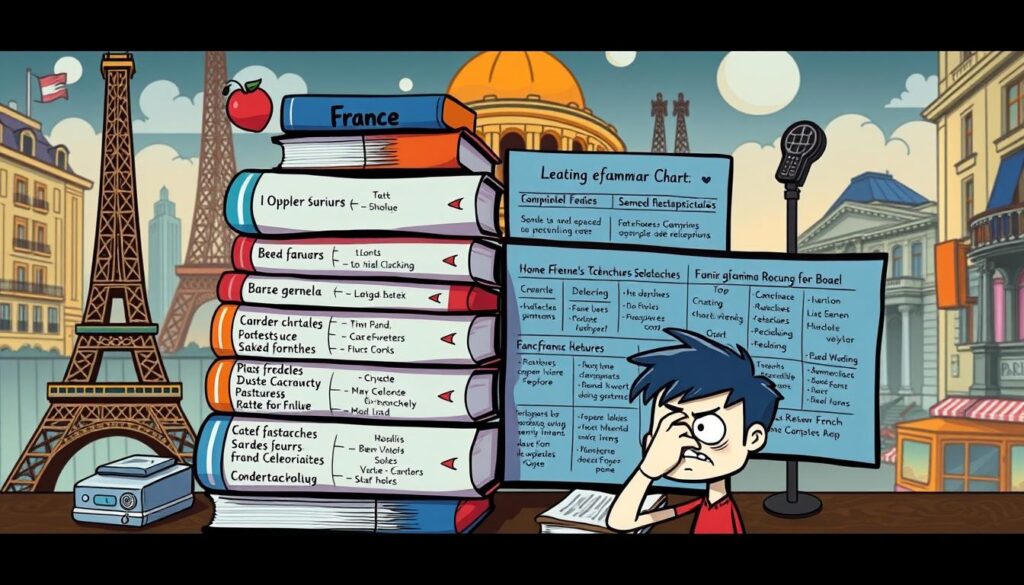When deciding whether to learn French or Russian, you’re opening a door to new cultures. The debate of french vs russian language learning brings up a world of opportunities and challenges. French is key in the arts, diplomacy, and is spoken in Europe and many African countries. It offers a global presence and business advantages. It’s also a good start for learning more Romance languages, showing its value.
On the other hand, Russian offers insight into a rich culture and literature. It also opens paths to unique job markets with high demand for Russian speakers. Do you want a language that unlocks opportunities in Russian-speaking areas, or do you prefer the usability of French?
Exploring each language’s details, French might be easier to start with. It has a shorter learning curve. Meanwhile, Russian could boost your personal and career growth with its complexity. Whether you aim to connect with the French-speaking world or target Russian markets, your choice should match your interests and goals.
Consider starting with Babbel or Duolingo for language learning. Babbel offers structured French lessons and more. It uses a subscription model. Duolingo introduces over 30 languages for free, appealing to many beginners. If you prefer listening, Coffee Break’s French podcasts could be a fun way to learn, with room to explore more languages.
Whether you’re drawn to French’s romance or Russian’s mystique, both offer cultural and professional benefits. Choosing french vs russian language learning is more about personal growth than picking the “better” language. It’s about how the language fits your life and dreams.
Understanding Your Motivation for Language Learning
Deciding between French or Russian? It helps to know what drives you. You might be drawn to the culture of the language, its usefulness in your work, or personal growth. Let’s look at how these motivations match with learning French and Russian.
The Role of Passion in Mastering a New Language
Passion is crucial in learning languages. It keeps you going, even when it gets tough. Maybe you love French films, Russian books, or talking to people in their own language. This passion can make learning faster and more fun. Studies say learning with passion leads to the best progress.
Evaluating Language Usefulness in Your Personal Context
Choosing between French and Russian also means thinking about their use in your life and future. Both languages are useful, but in different ways. French is key in many fields like international relations and art. It’s spoken all over the world. Russian is important in science and technology, especially in Eastern Europe and Central Asia.
Think about how each language fits with your career or hobbies. Learning French or Russian can open up new cultural experiences and community connections.
Your decision should align with your goals, whether they’re for work or just for you. Remember, the importance of languages like Russian and French change with global trends. They keep evolving with the world’s politics and cultures.
Is it Better to Learn French or Russian?
When looking at French versus Russian, advantages of learning French and Russian are key. Your choice may be swayed by personal interest, language popularity, and job options.
French plays a big role in world business and diplomacy. It’s the internet’s third most common language and is used in 29 countries. Learning French can boost your global reach and career, especially in international firms or jobs.
Russian, however, is key for geopolitics and seen as crucial by the U.S. government. This makes Russian speakers sought after for government posts, offering careers in security and diplomacy.
| Aspect | French | Russian |
|---|---|---|
| Countries Spoken | 29 | 19 |
| Internet Usage Rank | 3rd | Not in top 3 |
| Projected Speaker Growth by 2050 | 750 million | Stable but not as fast-growing |
| Career Opportunities | Business, Diplomacy | Government, Security |
| Economic Benefits | Increase earnings by 2-3% | High demand in specific government roles |
Deciding which language to learn means looking at what they offer for your future. When choosing between learning French or Russian, think about their cultural draw, career potential, and the number of global speakers. Your decision should match your ambitions and how you plan to use the language.
Analyzing the Difficulty: French vs Russian Language Learning
Deciding between learning French or Russian involves understanding crucial differences. You must look at aspects like the alphabet, grammar, and how long it takes to learn. This helps you choose what fits your linguistic goals and abilities.
Comparing the Alphabet and Grammar Complexity
French is seen as easier for English speakers because it uses the Latin alphabet. This alphabet has 26 letters, just like English. This makes starting to learn French or Russian much simpler. French and English share common parts of grammar, such as articles, verb tenses, and pronouns. They also have many similar words because of their Latin roots.
On the other hand, Russian introduces the Cyrillic alphabet. It has some similarities to Latin but includes unique characters to learn. Also, Russian grammar is more complex. It has three genders and complex verb conjugations, making it tougher for beginners.
Estimating Learning Time for French and Russian
Learning French usually takes less time because of its similarities to English. Studies show that an English speaker might become proficient in French within 23-24 weeks of intense study. However, mastering Russian could take about 44 weeks. This is due to its complex verb details and declensions.
If you’re looking to start learning French or Russian, or even both, LanguageYard can help. It offers tailored resources to efficiently begin your language learning journey.
| Feature | French | Russian |
|---|---|---|
| Alphabet | Latin (26 letters) | Cyrillic (33 letters) |
| Grammar Complexity | Less complex (No cases, fewer tenses) | Highly complex (Numerous cases, extensive conjugation) |
| Estimated Learning Time | 23-24 weeks | 44 weeks |
Economic and Cultural Benefits of Learning French and Russian
Exploring the benefits of learning French and Russian unveils economic and cultural opportunities. These can greatly enrich your life. The economic impact and cultural richness of these languages are key as global dynamics shift.
French is known as the language of diplomacy. It opens doors to francophone countries across continents. Speaking French promotes cultural exchanges and economic opportunities. Imagine navigating through Senegal’s marketplaces or Belgian corporate rooms. Speaking French gives you an edge in the global economy. Moreover, learning French or Russian invites you into a world of rich cultural heritage. This includes arts, literature, and scientific achievements.
Russian connects you to major economic ventures in Eastern Europe and Central Asia. It’s spoken by about 258 million people worldwide. Its role is vital in international business, especially in oil, gas, and mining. Russian culture, known for literature, ballet, and classical music, broadens your world view.
“Learning either French or Russian not only deepens your cultural appreciation but also amplifies your professional capabilities in the global market.”
Below is a table with the cultural and economic opportunities of learning French versus Russian:
| Aspect | French | Russian |
|---|---|---|
| Economic Opportunities | Extensive in Europe and Africa | Significant in Eastern Europe and energy sectors |
| Cultural Richness | Global arts, cuisine, science | Literature, performing arts, classical music |
| Global Influence | Official language in international diplomacy | Substantial internet content and business communication |
French and Russian offer cultural insight and economic benefits. When choosing, think about your career goals, travel dreams, and cultural interests. Each language offers unique advantages for your growth.
Learning French or Russian for Personal Growth: Which Language Fosters More?
Choosing between learning French or Russian for personal growth is about more than just the language. It’s picking a path to new skills, views, and experiences. The benefits vary depending on how you connect with the culture and use the language.
French, with over 300 million speakers worldwide, boasts a global presence and a rich cultural background. It opens up a world of art, science, and cuisine. French enhances travels, especially in France, the world’s top tourist destination.
Russian offers a challenging yet rewarding intellectual journey. Its complex grammar and Cyrillic script sharpen cognitive skills. Exploring Russian literature or folklore boosts problem-solving and creative thinking.
| Attribute | French | Russian |
|---|---|---|
| Native Speakers | Over 300 million | Approximately 150 million |
| Global Influence | Official language in 29 countries | Significant influence in Eastern Europe and Asia |
| Cultural Experience | Rich in arts, cuisine, science | Rich in literature, history, art forms |
When thinking about which language might enrich your life, consider your interests. French might appeal if you love arts or travel to French-speaking places. Russian could open up deep cultural and historical insights.
Choose French for global communication or Russian for its deep intellectual challenge. Your choice should reflect your goals and the cultural experiences you seek. Learning a language is about connecting deeply with the world. Both French and Russian offer a rich journey of discovery and cognitive growth.
Choosing Between Learning French or Russian Based on Career Opportunities
When deciding between French and Russian, think about your career goals. French is key in international business and diplomacy. It’s important in Europe and Africa, with hopes to have 750 million speakers by 2050. Russian, however, is vital for jobs in Eastern Europe and Central Asia. It’s also considered a strategic language in the U.S. and is used in big organizations like the United Nations. Your choice should reflect your career needs and the benefits of each language.
If you’re drawn to global issues like cybersecurity or oil and gas geopolitics, Russian could give you an edge. Russia’s role in the world means that speaking Russian is more than just language skills. It shows you understand Russian and post-Soviet cultures, which is valuable worldwide. On the other hand, if you’re interested in working in French-speaking areas or with international groups where French is critical, then French might be your ticket. Fields like tech, tourism, and education are looking for French speakers, especially with the expected growth in French speakers.
Choosing the right language depends on market needs. Picking between French or Russian might seem tough, but think about the industries in those language areas. Consider how your career could connect with those economies. Whether your path leads to France’s cultural scenes or the strategic sectors of Russian-speaking areas, both languages offer great career chances. Learning French or Russian will open up many professional opportunities.


